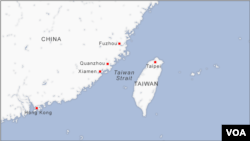The United States sent two Navy ships through the Taiwan Strait on Monday as the U.S. military increased the frequency of movement through the strategic waterway despite opposition from China.
The voyage risks further raising tensions with China but will likely be viewed by self-ruled Taiwan as a sign of support from the Trump administration amid growing friction between Taipei and Beijing.
The movement comes as U.S. President Donald Trump said the United States and China are "very, very close" to a deal to end a months-long trade war that has slowed global growth and disrupted markets.
The U.S. Navy's passage through the Taiwan Strait also comes just days before a summit between Trump and North Korea's Kim Jong Un.
"The ships' transit through the Taiwan Strait demonstrates the U.S. commitment to a free and open Indo-Pacific," the U.S. Pacific Fleet said in a statement.
The two ships were identified as the destroyer Stethem and Navy cargo and ammunition ship Cesar Chavez, the statement added. The 180-km-wide (111.85 mile) Taiwan Strait separates Taiwan from China.
Washington has no formal ties with Taiwan, but is bound by law to help defend the island nation and is its main source of arms. The Pentagon says Washington has sold Taiwan more than $15 billion in weaponry since 2010.
China has been ramping up pressure to assert its sovereignty over the island, which it considers a breakaway province of "one China."
China has repeatedly sent military aircraft and ships to circle the island on drills in the past few years and worked to isolate the island internationally, whittling down its few remaining diplomatic allies.
Earlier this year, the U.S. Defense Intelligence Agency released a report describing Taiwan as the "primary driver" for China's military modernization, which it said had made major advances in recent years.
Taiwan is one of a growing number of flashpoints in the U.S.-China relationship, which also include a trade war, U.S. sanctions and China's increasingly muscular military posture in the South China Sea, where the United States also conducts freedom of navigation patrols.






